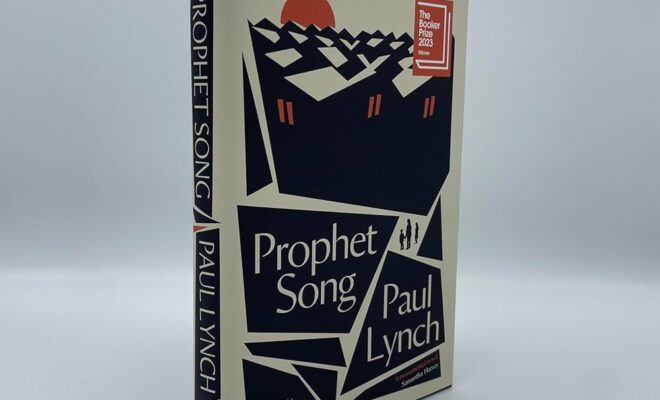‘Must read’ book: Prophet Song – Paul Lynch

In the 2024 Booker Prize-winning Prophet Song by Paul Lynch, the world ends slowly and then all at once in Ireland. Two years after coming into power, the authoritarian National Alliance Party has passed the Emergency Powers Act “in response to the ongoing crisis facing the state,” giving seemingly boundless powers to the Garda National Services Bureau, a new secret police force. To the GNSB, people who exercise constitutional rights that were previously foundational to liberal democracy — the right to protest, for one — are seditious. But Lynch’s focus is not on the NAP’s rise to power or the inner workings of the authoritarian state. Instead, he zeroes in on one family’s experience of the end of the world knocking on their door
At first Eilish Stack doesn’t hear — or doesn’t want to hear — “the sharp, insistent rapping” that rains down upon the door of her Dublin home on the novel’s first page. She’s standing in her kitchen at the end of a long day of working at the biotech firm where she is a senior manager and also dealing with her four children, who range in age from mere months old to 16. Her husband, Larry, the deputy general secretary of the Teachers’ Union of Ireland, is not yet home. When she answers the door, it is Larry to whom two GNSB plainclothesmen want to speak, whose presence they request at the garda station late on a dark and rainy night. By the end of Prophet Song‘s first chapter, Larry has been disappeared by the GNSB along with other trade unionists and teachers for engaging in a peaceful union march, and Eilish’s waking nightmare has commenced
Eilish now has to navigate a world filled with rumours, half-truths, and imminent danger. The story shifts from speculative dystopia to an all-too-real narrative. The message is clear – any protest comes with a heavy price
Much of Prophet Song deals with the domestic and mundane aspects of Eilish’s life – keeping the fridge stocked with milk, ferrying the older children to school, soothing the baby’s gums as he teethes – even as the regime sets curfews, as thugs vandalize her car, as airstrikes hit her neighbourhood. At one point, she deep-cleans the kitchen despite “an explosion close by shaking the ground so that she must hold onto the sink with two hands,” a scene that recalls the apocryphal band playing as the Titanic sank. Though her sister in Toronto admonishes Eilish that “history is a silent record of people who did not know when to leave,” knowing when to leave is not so simple – leaving isn’t simple
The plot-driven narrative follows the Stack family as they confront the threat to their existence. The novel doesn’t delve deep into the intricacies of the political landscape, but instead, it focuses on the family’s struggle to adapt as their world unravels. As they face mounting challenges, their country teeters on the brink of chaos. Simultaneously, the story depicts the growing resistance against the regime, with people of all ages wearing white and joining protest marches. The government-controlled media warns of an impending crackdown, leading to these two narrative strands collapsing. Sixteen-year-old Mark, the Stack family’s son, escapes home to join the rebels, and civil war erupts on the streets of Dublin
As Prophet Song ends, the pace intensifies, and the story expands beyond the confines of one country. Eilish’s journey symbolises fleeing from tyranny in search of freedom. The novel paints a vivid and distressing portrait of ordinary individuals caught in the web of authoritarian governments and the following conflicts
Prophet Song is a weighty work of fiction that demands the reader’s undivided attention. The writing style is dense, with lengthy, punctuation-free paragraphs, sometimes resembling a monologue. However, the book’s powerful message underscores the importance of paying heed to its narrative. It serves as a poignant reminder of the enduring struggles faced by those living under oppressive regimes
If Prophet Song were a horror novel, it wouldn’t feel nearly as terrifying. But his story about the modern-day ascent of fascism is so contaminated with plausibility that it’s impossible not to feel poisoned by swelling panic. This is not a book that presents political oppression as an intellectual problem to be anticipated or solved. It aims for a visceral reaction, and it doesn’t miss
Leave a reply
You must be logged in to post a comment.







